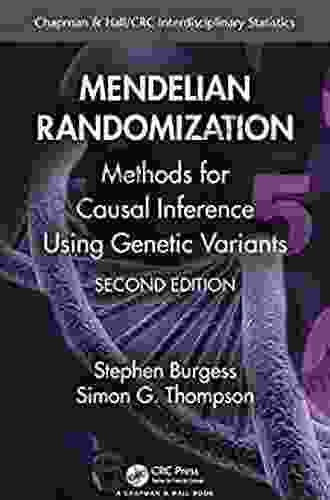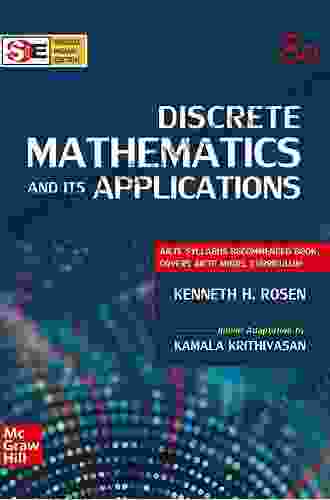Methods For Causal Inference Using Genetic Variants

Causal inference is a fundamental goal of scientific research. In particular, the ability to infer causality from observational data is of great interest in many fields, including epidemiology, economics, and social science. However, observational data can be subject to confounding, which can bias the results of causal inference analyses. Genetic variants, which are inherited from parents and are not subject to confounding, can be used to overcome this problem.
There are a number of different methods for causal inference using genetic variants. The most common method is Mendelian randomization, which uses genetic variants as instrumental variables to estimate the causal effect of an exposure on an outcome. Mendelian randomization has a number of advantages over other methods, including its ability to control for confounding and its ability to estimate causal effects in the absence of random assignment.
5 out of 5
| Language | : | English |
| File size | : | 16954 KB |
| Screen Reader | : | Supported |
| Print length | : | 240 pages |
Other methods for causal inference using genetic variants include instrumental variables, mediation analysis, and gene-environment interaction analysis. Instrumental variables analysis is similar to Mendelian randomization, but it uses genetic variants that are not associated with the exposure to estimate the causal effect of the exposure on the outcome. Mediation analysis is used to determine whether the effect of an exposure on an outcome is mediated by a third variable. Gene-environment interaction analysis is used to determine whether the effect of an exposure on an outcome is modified by genetic variants.
Methods for Causal Inference Using Genetic Variants
Mendelian Randomization
Instrumental Variables
Mediation Analysis
Gene-Environment Interaction Analysis
Mendelian randomization (MR) is a method for causal inference that uses genetic variants as instrumental variables (IVs) to estimate the causal effect of an exposure on an outcome. MR is based on the principle that genetic variants are randomly assigned at conception, and thus are not subject to confounding. This makes them ideal for use as IVs, as they can be used to control for confounding factors that may bias the results of observational studies.
MR has a number of advantages over other methods for causal inference. First, MR can be used to estimate causal effects in the absence of random assignment. This is important because it allows researchers to study the effects of exposures that are not amenable to experimental manipulation, such as smoking or air pollution.
Second, MR can be used to control for confounding factors that may bias the results of observational studies. Confounding occurs when a third variable is associated with both the exposure and the outcome, and biases the estimate of the causal effect of the exposure on the outcome. MR can control for confounding by using genetic variants as IVs. Genetic variants are not associated with confounding factors, so they can be used to estimate the causal effect of the exposure on the outcome without bias.
Third, MR can be used to estimate causal effects in the presence of unmeasured confounding. Unmeasured confounding occurs when there is a third variable that is associated with both the exposure and the outcome, but is not measured in the study. MR can control for unmeasured confounding by using genetic variants as IVs.
Instrumental variables (IVs) are variables that are associated with the exposure, but are not associated with the outcome, except through the exposure. This makes them ideal for use in causal inference, as they can be used to estimate the causal effect of the exposure on the outcome without bias.
Genetic variants can be used as IVs in MR because they are randomly assigned at conception, and thus are not associated with confounding factors. This makes them ideal for use in MR, as they can be used to control for confounding factors that may bias the results of observational studies.
Mediation analysis is a method for determining whether the effect of an exposure on an outcome is mediated by a third variable. Mediation occurs when the exposure causes the mediator, and the mediator causes the outcome. Mediation analysis can be used to determine the extent to which the effect of the exposure on the outcome is mediated by the mediator.
Genetic variants can be used as mediators in mediation analysis because they can be used to identify the causal effect of the exposure on the outcome, and the causal effect of the mediator on the outcome. This information can then be used to determine the extent to which the effect of the exposure on the outcome is mediated by the mediator.
Gene-environment interaction (GxE) analysis is a method for determining whether the effect of an exposure on an outcome is modified by genetic variants. GxE occurs when the effect of the exposure on the outcome is different for individuals with different genotypes. GxE analysis can be used to identify genetic variants that modify the effect of the exposure on the outcome.
GxE analysis can be used to identify genetic variants that increase or decrease the risk of disease. This information can then be used to develop personalized prevention and treatment strategies for individuals with different genotypes.
Methods for causal inference using genetic variants are a powerful tool for understanding the causes of disease and other health outcomes. These methods have the potential to improve our understanding of the genetic and environmental factors that contribute to disease, and to develop more effective prevention and treatment strategies.
References
- Smith, G. D., & Ebrahim, S. (2003). Mendelian randomization: prospects for studying gene-environment interactions in cardiovascular disease. Journal of internal medicine, 254(6),437-453.
- Lawlor, D. A., Harbord, R. M., Sterne, J. A., Timpson, N., Davey Smith, G., &
5 out of 5
| Language | : | English |
| File size | : | 16954 KB |
| Screen Reader | : | Supported |
| Print length | : | 240 pages |
Do you want to contribute by writing guest posts on this blog?
Please contact us and send us a resume of previous articles that you have written.
 Fiction
Fiction Non Fiction
Non Fiction Romance
Romance Mystery
Mystery Thriller
Thriller SciFi
SciFi Fantasy
Fantasy Horror
Horror Biography
Biography Selfhelp
Selfhelp Business
Business History
History Classics
Classics Poetry
Poetry Childrens
Childrens Young Adult
Young Adult Educational
Educational Cooking
Cooking Travel
Travel Lifestyle
Lifestyle Spirituality
Spirituality Health
Health Fitness
Fitness Technology
Technology Science
Science Arts
Arts Crafts
Crafts DIY
DIY Gardening
Gardening Petcare
Petcare Syougo Kinugasa
Syougo Kinugasa Pat Dorsey
Pat Dorsey Alden Jones
Alden Jones Theresa Cheung
Theresa Cheung Linda A Roussel
Linda A Roussel Robert Pondiscio
Robert Pondiscio Nathalie Dupree
Nathalie Dupree 2nd Edition Kindle Edition
2nd Edition Kindle Edition Jean Clottes
Jean Clottes Tom Lyons
Tom Lyons Leonard Pellman
Leonard Pellman Monica Sorrenson
Monica Sorrenson Patrick E Mcgovern
Patrick E Mcgovern Filipe Masetti Leite
Filipe Masetti Leite Sam Goulden
Sam Goulden Andrew Weber
Andrew Weber Alessa Ellefson
Alessa Ellefson Amy Chua
Amy Chua Naomi Feil
Naomi Feil Terence N D Altroy
Terence N D Altroy L Ulloque
L Ulloque Charles Seife
Charles Seife Gregory A Boyd
Gregory A Boyd John Kreiter
John Kreiter Justin Bower
Justin Bower Lewis Henry Morgan
Lewis Henry Morgan 1st Ed 2016 Edition Kindle Edition
1st Ed 2016 Edition Kindle Edition Jamie Hand
Jamie Hand Katie J Trent
Katie J Trent Josh Elster
Josh Elster Andre Norton
Andre Norton Gregory J Privitera
Gregory J Privitera Joseph E Garland
Joseph E Garland Tony Horton
Tony Horton Jason Miller
Jason Miller L S Boos
L S Boos Gary S Thorpe
Gary S Thorpe Barnett Rich
Barnett Rich Harry Middleton
Harry Middleton Eloise Jarvis Mcgraw
Eloise Jarvis Mcgraw 4th Edition Kindle Edition
4th Edition Kindle Edition Dan Blackburn
Dan Blackburn Dan Wingreen
Dan Wingreen Allan Mundsack
Allan Mundsack Steve Magness
Steve Magness Stefan Hofer
Stefan Hofer Alan Jacobs
Alan Jacobs Robert K Tyson
Robert K Tyson Herbert Feigl
Herbert Feigl Theodor W Adorno
Theodor W Adorno Natasha Preston
Natasha Preston Collins Gcse
Collins Gcse Buddy Martin
Buddy Martin Keith Siragusa
Keith Siragusa Mohamed Elgendy
Mohamed Elgendy Barbara Klein
Barbara Klein Robert Peter Gale
Robert Peter Gale Elizabeth Wenk
Elizabeth Wenk George Pendle
George Pendle Chris Lehto
Chris Lehto Elizabeth Sims
Elizabeth Sims Lars Behnke
Lars Behnke Ernest Shackleton
Ernest Shackleton Michael W Ford
Michael W Ford Steve Garnett
Steve Garnett Olszewski Marie Erin
Olszewski Marie Erin Patricia S Potter Efron
Patricia S Potter Efron 1st English Ed Edition Kindle Edition
1st English Ed Edition Kindle Edition Eric I Karchmer
Eric I Karchmer Mary H K Choi
Mary H K Choi Caroline Porter Thomas
Caroline Porter Thomas Patrick Hunt
Patrick Hunt Martha Menchaca
Martha Menchaca John Collins
John Collins Seymour Simon
Seymour Simon Patrick Lange
Patrick Lange Ellen Sue Turner
Ellen Sue Turner Dr Katayune Kaeni
Dr Katayune Kaeni William A Dembski
William A Dembski Paul Martin
Paul Martin G I Gurdjieff
G I Gurdjieff Bill Reif
Bill Reif Christy Jordan
Christy Jordan Natalie Smith
Natalie Smith Leigh Calvez
Leigh Calvez Joe Oliver
Joe Oliver Frank Sargeant
Frank Sargeant Rifujin Na Magonote
Rifujin Na Magonote Manuel De La Cruz
Manuel De La Cruz Richard Bromfield
Richard Bromfield Claudio De Castro
Claudio De Castro Eric Dominy
Eric Dominy Katie M John
Katie M John Micah Goodman
Micah Goodman Evan Brashier
Evan Brashier Mike Tyson
Mike Tyson Jasmine Greene
Jasmine Greene Aly Madhavji
Aly Madhavji Tom Mchale
Tom Mchale Billie Jean King
Billie Jean King Elizabeth D Hutchison
Elizabeth D Hutchison Juno Dawson
Juno Dawson Martin Mobraten
Martin Mobraten Joseph Chilton Pearce
Joseph Chilton Pearce Neal Bascomb
Neal Bascomb Melissa Cheyney
Melissa Cheyney Al Ford
Al Ford Paul Johnson
Paul Johnson Karl Morris
Karl Morris Z Justin Ren
Z Justin Ren Aubrey Clayton
Aubrey Clayton Nikki Grimes
Nikki Grimes Duy Tran
Duy Tran Sam Irwin
Sam Irwin Dr Danny Penman
Dr Danny Penman Thomas R Baechle
Thomas R Baechle Heather Job
Heather Job J Michael Leger
J Michael Leger Karen Myers
Karen Myers Howard Mudd
Howard Mudd Gershon Ben Keren
Gershon Ben Keren Manhattan Prep
Manhattan Prep L Madison
L Madison Justin Hammond
Justin Hammond Breanna Lam
Breanna Lam Jason Curtis
Jason Curtis Deepak Chopra
Deepak Chopra Ziemowit Wojciechowski
Ziemowit Wojciechowski Mitch Rubman
Mitch Rubman Jeremy Desilva
Jeremy Desilva Christoph Delp
Christoph Delp Jay Cassell
Jay Cassell Marisha Pessl
Marisha Pessl Chris Froome
Chris Froome Jd Brown
Jd Brown Mark Brazil
Mark Brazil Carl J Sindermann
Carl J Sindermann Liesbet Collaert
Liesbet Collaert Andrew Maraniss
Andrew Maraniss Dervla Murphy
Dervla Murphy Bertolt Brecht
Bertolt Brecht Lee Smolin
Lee Smolin 50minutes Com
50minutes Com Chris I Naylor
Chris I Naylor Kate Spencer
Kate Spencer Joe Cuhaj
Joe Cuhaj Paul Deepan
Paul Deepan Bryan Smith
Bryan Smith A C Grayling
A C Grayling Monte Burch
Monte Burch Tasha Dunn
Tasha Dunn Apsley Cherry Garrard
Apsley Cherry Garrard Terence Grieder
Terence Grieder Deanne Howell
Deanne Howell Shelby Hailstone Law
Shelby Hailstone Law A R Bernard
A R Bernard James D Long
James D Long Simon G Thompson
Simon G Thompson Mark Gregston
Mark Gregston Adam Silvera
Adam Silvera Andrea Wulf
Andrea Wulf Tom Pyszczynski
Tom Pyszczynski Lin Pardey
Lin Pardey Hong Chen
Hong Chen Rowan Ricardo Phillips
Rowan Ricardo Phillips Iris Bohnet
Iris Bohnet David Beaupre
David Beaupre Tok Hui Yeap Rd Csp Ld
Tok Hui Yeap Rd Csp Ld Jack M Bloom
Jack M Bloom Dave Gerr
Dave Gerr Gail Craswell
Gail Craswell E Bruce Goldstein
E Bruce Goldstein Lois Duncan
Lois Duncan Mark V Wiley
Mark V Wiley Naomi Scott
Naomi Scott Lareina Rule
Lareina Rule Bernard Cornwell
Bernard Cornwell Heather Demetrios
Heather Demetrios Patricia Moore Pastides
Patricia Moore Pastides Laurie Forest
Laurie Forest Jessica Shortall
Jessica Shortall Dan Falk
Dan Falk Carol Stock Kranowitz
Carol Stock Kranowitz Don Fink
Don Fink Jasper Godwin Ridley
Jasper Godwin Ridley Robert Bauval
Robert Bauval Justin Doyle
Justin Doyle J D Salinger
J D Salinger Marty Bartholomew
Marty Bartholomew John Green
John Green Ben Egginton
Ben Egginton James Mcnicholas
James Mcnicholas 6th Edition Kindle Edition
6th Edition Kindle Edition Louis Liebenberg
Louis Liebenberg Jamaica Stevens
Jamaica Stevens Jordan Ifueko
Jordan Ifueko Bonnie Scott
Bonnie Scott Robert S Mueller
Robert S Mueller Elaine Beaumont
Elaine Beaumont Michael Alvear
Michael Alvear 50minutos Es
50minutos Es Mei Fong
Mei Fong Alec Crawford
Alec Crawford Wong Kiew Kit
Wong Kiew Kit A Christine Harris
A Christine Harris Starley Talbott
Starley Talbott Prerna Lal
Prerna Lal Glenn N Levine
Glenn N Levine Patricia O Quinn
Patricia O Quinn Kerri Maniscalco
Kerri Maniscalco Margaret Littman
Margaret Littman Tim R Wolf
Tim R Wolf Cindy Kennedy
Cindy Kennedy Pamela Adams
Pamela Adams Muata Ashby
Muata Ashby Amy Ogle
Amy Ogle Nadav Snir
Nadav Snir Kristi K Hoffman
Kristi K Hoffman Michael Clarke
Michael Clarke Cynthia Bourgeault
Cynthia Bourgeault Jozef Nauta
Jozef Nauta Robert Ferguson
Robert Ferguson Sarah Templeton
Sarah Templeton Josh Mulvihill
Josh Mulvihill Greta Solomon
Greta Solomon Fata Ariu Levi
Fata Ariu Levi Greg Midland
Greg Midland Chase Williams
Chase Williams Grant Thompson
Grant Thompson Lesli Richards
Lesli Richards Michaela Stith
Michaela Stith Meik Wiking
Meik Wiking Clint Malarchuk
Clint Malarchuk Kristine Setting Clark
Kristine Setting Clark Terrence Real
Terrence Real Geri Ann Galanti
Geri Ann Galanti Dustyn Roberts
Dustyn Roberts John Gribbin
John Gribbin Michael Geheran
Michael Geheran Porter Fox
Porter Fox Andrew Shapland
Andrew Shapland Leslie Leyland Fields
Leslie Leyland Fields Laura Bright
Laura Bright Kyla Stone
Kyla Stone Brian Kent
Brian Kent Jon Dunn
Jon Dunn Kate Usher
Kate Usher Ellen Levitt
Ellen Levitt Oliver Theobald
Oliver Theobald Emily A Duncan
Emily A Duncan Andrew Collins
Andrew Collins Cassandra Johnson
Cassandra Johnson Brennan Barnard
Brennan Barnard Nnedi Okorafor
Nnedi Okorafor Suzie Cooney
Suzie Cooney Debra Pascali Bonaro
Debra Pascali Bonaro Jong Chul Ye
Jong Chul Ye Roger Gordon
Roger Gordon Broccoli Lion
Broccoli Lion P G Maxwell Stuart
P G Maxwell Stuart Jacqueeia Ferguson
Jacqueeia Ferguson Miranda Castro
Miranda Castro 7th Edition Kindle Edition
7th Edition Kindle Edition Jenifer Fox
Jenifer Fox Nancy Keene
Nancy Keene John Hands
John Hands Lucas Whitecotton
Lucas Whitecotton David Kushner
David Kushner Michael Romano
Michael Romano Stephen P Anderson
Stephen P Anderson Jillian Dodd
Jillian Dodd Tami Lynn Kent
Tami Lynn Kent Mark Hatmaker
Mark Hatmaker Patrick Viafore
Patrick Viafore 3rd Edition Kindle Edition
3rd Edition Kindle Edition John Gookin
John Gookin Robert Mcentarffer
Robert Mcentarffer Jeffrey A Greene
Jeffrey A Greene Diane Duane
Diane Duane 5th Edition Kindle Edition
5th Edition Kindle Edition Robert A Johnson
Robert A Johnson Maureen Johnson
Maureen Johnson John Iceland
John Iceland Stewart Smith
Stewart Smith Tyler Vanderweele
Tyler Vanderweele Emma Dalton
Emma Dalton 2012th Edition Kindle Edition
2012th Edition Kindle Edition Chris Dietzel
Chris Dietzel Brenda Dehaan
Brenda Dehaan Rashad Jennings
Rashad Jennings Andy Charalambous
Andy Charalambous Alice Ginott
Alice Ginott Theris A Touhy
Theris A Touhy Garrett Grolemund
Garrett Grolemund Mauricio Cabrini
Mauricio Cabrini Richard Adams
Richard Adams Sherry Monahan
Sherry Monahan Skye Genaro
Skye Genaro 8th Edition Kindle Edition
8th Edition Kindle Edition Claire Sierra
Claire Sierra Joe Chilson
Joe Chilson Tony Hernandez Pumarejo
Tony Hernandez Pumarejo Chris Stewart
Chris Stewart Marcia Verduin
Marcia Verduin Kekla Magoon
Kekla Magoon 2005th Edition Kindle Edition
2005th Edition Kindle Edition Leon Anderson
Leon Anderson Tracy Gharbo
Tracy Gharbo David Simkins
David Simkins Bookrags Com
Bookrags Com Bree Moore
Bree Moore Jiichi Watanabe
Jiichi Watanabe Betty Crocker
Betty Crocker Dinokids Press
Dinokids Press Janet Sasson Edgette
Janet Sasson Edgette Sloane Mcclain
Sloane Mcclain Icon Digital Publishing
Icon Digital Publishing Dr Brenda Stratton
Dr Brenda Stratton Brian Thompson
Brian Thompson Lenora Ucko
Lenora Ucko Ricki E Kantrowitz
Ricki E Kantrowitz Edward Frenkel
Edward Frenkel Andrew G Marshall
Andrew G Marshall Eric Haseltine
Eric Haseltine Susan Walker
Susan Walker Bruce Watson
Bruce Watson Kelly Skeen
Kelly Skeen Claire Baker
Claire Baker Lj Rivers
Lj Rivers William Regal
William Regal Marie Louise Von Franz
Marie Louise Von Franz Louis Stanislaw
Louis Stanislaw Brooklyn James
Brooklyn James 3rd Ed Edition Kindle Edition
3rd Ed Edition Kindle Edition David Cheng
David Cheng Edyta Roszko
Edyta Roszko Temple Grandin
Temple Grandin J Morgan Mcgrady
J Morgan Mcgrady Jeff Gill
Jeff Gill Yan Shen
Yan Shen 4th Edition Kindle Edition With Audio Video
4th Edition Kindle Edition With Audio Video 1st Edition Kindle Edition
1st Edition Kindle Edition Dalai Lama
Dalai Lama Gina Rae La Cerva
Gina Rae La Cerva Geoffrey West
Geoffrey West Janetti Marotta
Janetti Marotta Richard Ania
Richard Ania Whit Honea
Whit Honea Robert Venditti
Robert Venditti Raymond H Thompson
Raymond H Thompson Kerry Fraser
Kerry Fraser Peter Wohlleben
Peter Wohlleben Christopher Mcdougall
Christopher Mcdougall Christa Orecchio
Christa Orecchio 006 Edition Kindle Edition
006 Edition Kindle Edition Donna M Mertens
Donna M Mertens Eva Feder Kittay
Eva Feder Kittay Peter Dewhurst
Peter Dewhurst Leonardo Trasande
Leonardo Trasande Samantha Lovely
Samantha Lovely Theodore X O Connell
Theodore X O Connell Miko Flohr
Miko Flohr Christopher Lakeman
Christopher Lakeman Edward Rosenfeld
Edward Rosenfeld A Digger Stolz
A Digger Stolz John Coleman
John Coleman Bobby Blair
Bobby Blair Anthony Arvanitakis
Anthony Arvanitakis Justine Brooks Froelker
Justine Brooks Froelker Jacquetta Hawkes
Jacquetta Hawkes Gianni La Forza
Gianni La Forza Roselyn Teukolsky
Roselyn Teukolsky Jay Wilkinson
Jay Wilkinson Jo Frost
Jo Frost John A Yoegel
John A Yoegel Sadie Radinsky
Sadie Radinsky Kelly Slater
Kelly Slater Bob Welch
Bob Welch Eli Boschetto
Eli Boschetto David Lloyd Kilmer
David Lloyd Kilmer Vibrant Publishers
Vibrant Publishers Rick Gurnsey
Rick Gurnsey Nathan Jendrick
Nathan Jendrick Freda Mcmanus
Freda Mcmanus George W E Nickelsburg
George W E Nickelsburg Jonathan Ross
Jonathan Ross Sheryl Crow
Sheryl Crow Russell Miller
Russell Miller Robert Thurston
Robert Thurston James Diego Vigil
James Diego Vigil Thomas Wentworth Higginson
Thomas Wentworth Higginson Debra Barnes
Debra Barnes Nick Winkelman
Nick Winkelman Erika Bornman
Erika Bornman Mimi Lemay
Mimi Lemay Steve Kantner
Steve Kantner Jim Burns
Jim Burns Gayle Jervis
Gayle Jervis Riddleland
Riddleland Steven D Levitt
Steven D Levitt Patricia Stevens
Patricia Stevens Sandra Mizumoto Posey
Sandra Mizumoto Posey Nate G Hilger
Nate G Hilger Raymond Buckland
Raymond Buckland Bruno Latour
Bruno Latour Kevin Paul
Kevin Paul Ulla Sarmiento
Ulla Sarmiento A C Davison
A C Davison Peter Cossins
Peter Cossins Michael S Gazzaniga
Michael S Gazzaniga Gregory Collins
Gregory Collins Bernard Rosner
Bernard Rosner Emma Lord
Emma Lord Kenny Casanova
Kenny Casanova Kristen Riecke
Kristen Riecke Oscar Wegner
Oscar Wegner Shonna Slayton
Shonna Slayton Max Domi
Max Domi Daphne Adler
Daphne Adler Diamond Wilson
Diamond Wilson Susan E Cayleff
Susan E Cayleff Dominik Hartmann
Dominik Hartmann Heather Rain Mazen Korbmacher
Heather Rain Mazen Korbmacher Subsequent Edition Kindle Edition
Subsequent Edition Kindle Edition Elizabeth Bradfield
Elizabeth Bradfield Kennedy Achille
Kennedy Achille
Light bulbAdvertise smarter! Our strategic ad space ensures maximum exposure. Reserve your spot today!

 Bryce FosterUnveiling the Tapestry of Science History and the Intricate Workings of the...
Bryce FosterUnveiling the Tapestry of Science History and the Intricate Workings of the...
 Douglas PowellYA Authors and Teens on the Dark Side of Love: Exploring the Allure of Toxic...
Douglas PowellYA Authors and Teens on the Dark Side of Love: Exploring the Allure of Toxic... Johnny TurnerFollow ·4.8k
Johnny TurnerFollow ·4.8k Timothy WardFollow ·7.3k
Timothy WardFollow ·7.3k Don ColemanFollow ·10.4k
Don ColemanFollow ·10.4k George BellFollow ·2.6k
George BellFollow ·2.6k Junichiro TanizakiFollow ·6.1k
Junichiro TanizakiFollow ·6.1k Bret MitchellFollow ·13.1k
Bret MitchellFollow ·13.1k George MartinFollow ·2.3k
George MartinFollow ·2.3k Joe SimmonsFollow ·19.3k
Joe SimmonsFollow ·19.3k

 Finn Cox
Finn CoxA Comprehensive Guide for Budding Inventors and Backyard...
For those with a restless mind and a...

 Forrest Reed
Forrest ReedThe Ultimate Shopper's Guide to Purchasing Weight Lifting...
Are you looking...

 Dillon Hayes
Dillon HayesThe Chemical Choir: Unveiling the Enchanting Symphony of...
In the enigmatic realm of science, where...

 Ryūnosuke Akutagawa
Ryūnosuke AkutagawaStumbling Thru: Hike Your Own Hike
In the realm of outdoor adventures,...

 Terry Pratchett
Terry PratchettUnlock Your Math Skills: A Comprehensive Guide to Chenier...
Math plays a vital role in...
5 out of 5
| Language | : | English |
| File size | : | 16954 KB |
| Screen Reader | : | Supported |
| Print length | : | 240 pages |










